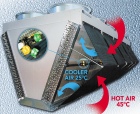Add-on adiabatic cooling boosts performance

The efficiency and performance of air-cooled chillers and dry coolers can both be enhanced using add-on adiabatic cooling from EcoMesh Adiabatic Systems. Because no water is stored, as in a cooling tower, there is no need for water treatment. The health risks associated with legionella bacteria are also avoided.
The principle of operation is that air being drawn through the heat rejection coils first passes through a non-metallic mesh which is sprayed with water. As this water evaporates, it cools the incoming air (adiabatic cooling), which improves the efficiency of the heat-rejection coil. Systems with a water-cooled heat-rejection method are said to by around 35% more efficient than their air-cooled counterparts.
These meshes can be fitted horizontally or vertically in any inclined position in front of a heat-rejection unit.
A simple bracket supports the mesh on the unit, whilst several clips ensure the meshes are kept away from the surface by hooking into any existing or new air-cooled heat-rejection surface.
This simplicity of design enables EcoMesh to be easily retrofitted to an existing heat-rejection system to improve efficiency or increase capacity.







